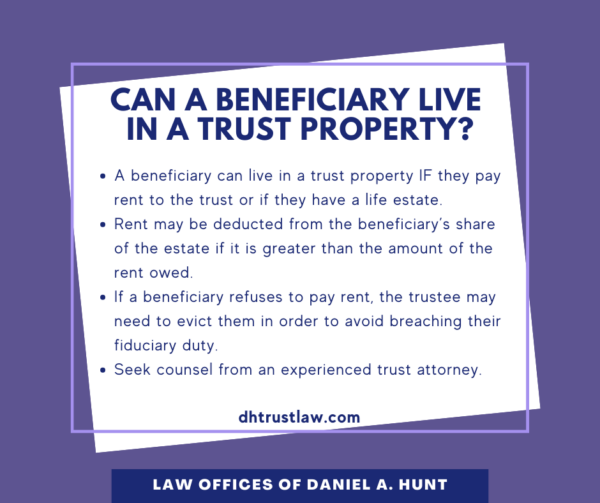Can a Beneficiary Live in a Trust Property?

When a person creates a revocable living trust, their home is often the most valuable asset in the trust. After the trust settlor passes away, the trust assets must be distributed to the beneficiaries. But what if another family member is already living in the family home or expresses a desire to move in? Can a beneficiary live in a trust property? Here’s what you need to know.
Challenges with a Beneficiary Living in the Trust Property
Once the trust settlor dies, the successor trustee has a duty to administer the trust and ultimately distribute the assets to the trust beneficiaries. The successor trustee has a Duty of Impartiality under the California Probate Code. This means a trustee cannot favor one beneficiary over the others. This includes themselves if they are also a beneficiary.
There probably won’t be a problem if there is one sole trustee and beneficiary, and that person wants to live in the home. But if one beneficiary is living in a home that needs to be distributed to multiple trust beneficiaries, then that tenant is receiving an unfair advantage. Allowing this to occur is a breach of the trustee’s fiduciary duty.
Can a Beneficiary Live in the Home Rent-Free?
Anyone living in the house must pay rent to the trust so as not to be favored over the other beneficiaries. No one, including the trustee, can live rent-free in a trust property. Sometimes the easiest way for rent to be paid is to deduct the rent amount from the tenant beneficiary’s portion of the estate. This method works, as long as the amount of the beneficiary’s inheritance is greater than the rent due. If not, another solution must be found.
If the beneficiary living in the home refuses to pay rent, the trustee may need to evict them in order to properly execute their duties. Seek counsel from a trust attorney for counsel on how to evict a tenant from a trust property.
Exceptions to Paying Rent
Are there any exceptions to a beneficiary needing to pay rent to the trust? In litigated matters, we occasionally see the Probate Court allow some rent-free occupancy if the beneficiary was living with the settlor in order to care for them prior to their passing. But this varies according to the discretion of the judge hearing the case.
The main exception is for individuals with life estates. A life estate is a form of ownership that allows one person to live in or on a piece of real property until they pass away. If the trust grants a life estate to an individual, that person can continue living in the home for the duration of their life.
At their death, the real property passes to the remainder owner(s) who take legal ownership of the property immediately upon the death of the last life tenant.
Seek Legal Counsel
While occasional exceptions may exist, the goal should be to achieve an arrangement that is fair to all parties involved. Whether you’re a trustee seeking to administer a trust or a beneficiary seeking to preserve your rights, seek the counsel of an experienced estate planning attorney for guidance through these complicated issues.
If you have any questions about whether a beneficiary can live in a trust property, feel free to contact our law firm.
Law Offices of Daniel A. Hunt
The Law Offices of Daniel A. Hunt is a California law firm specializing in Estate Planning; Trust Administration & Litigation; Probate; and Conservatorships. We've helped over 10,000 clients find peace of mind. We serve clients throughout the greater Sacramento region and the state of California.




